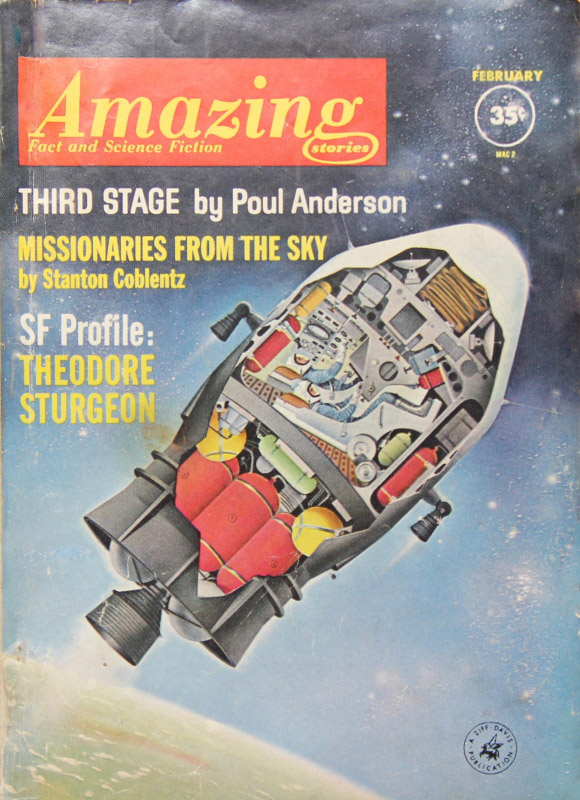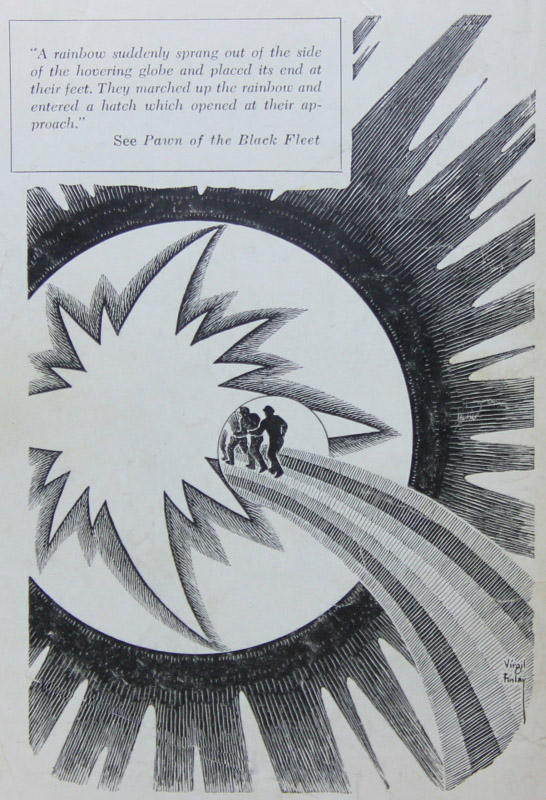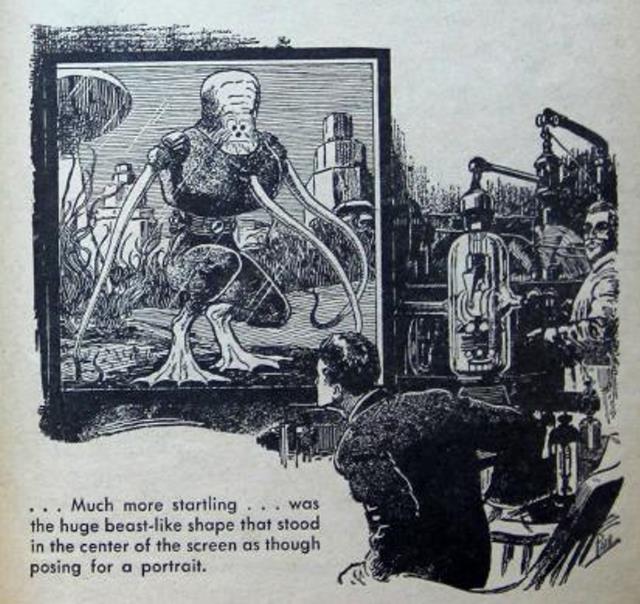I've reserved a special prize for my first guest author, Rosemary Benton. Today is January 2, and not only will her piece be the first of 1962, but it will be published concurrently with an important astronomical event. Every year, the Earth passes closest to the sun on the second day of the year, its "perihelion." If you're wondering why it's still so cold in January, it's because the seasons are controlled mostly by the planet's tilt, and only secondarily by its distance from the sun. On the other hand, this annual proximity does mean that, in general, Southern hemisphere summers are hotter, and Northern hemisphere winters are milder.
Anyway, today is also Isaac Asimov's birthday. He once wrote that perihelion occurs on the day that it does because it is the day the Good Doctor was born. Well, my nephew, David, took umbrage upon reading this bit. As it turns out, his birthday (and that of his mother) is also January 2. David wrote a letter to Dr. Asimov to set him straight: "January 2 is perihelion because it is my birthday and my mother's!
Asimov sent my nephew a postcard posthaste. It said, "By God, you're right!"
Now, without further ado, what you actually tuned in for:

by Rosemary Benton
Fate has been very kind to me throughout 1961. I was able to find a niche for myself as a university archivist, and I came across many people who shared my interest in all things science fiction. I have had the pleasure of publishing my thoughts on such amazing creators as Zenna Henderson and Andre Norton, and have even taken daring adventures to the shadier side of the science fiction entertainment industry. Finishing out the year with James Blish's The Star Dwellers was the cherry on top of a very delicious ice cream sundae.

The Star Dwellers is an exceptional science fiction achievement that both suscribes to the futurist tendencies of the genre, yet breaks with them at critical moments to create both stirring characters and plot. In the year 2050, scientific innovation and philosophy has allowed humans not only to leave Earth, but to discover and categorize other intelligent life. Even more shocking than finding other protoplasmic lifeforms (cell based creatures) is the discovery of alien lifeforms that take the "negative entropy" theory of life (explained in concise wording in the book's forward) to an entirely unexpected level.
Dubbed "Angels" by the popular imagination, these are beings of pure energy; some of which have existed since the first 20 minutes of the universe's conception. Desiring to learn from and about them, a small three man team is assembled to covertly venture into their home at the center of the Coal Sack nebula. Bearing the weight of the future of the whole Earth, this team's mission is simple: to determine what the agenda of this mysterious race is and, ideally, to reach an accord that is equally beneficial between the two races so unequal in power.
89 years from 1961, James Blish imagines a world that is solidly entrenched in classic Blish style, yet populated by a cast that showcases his maturity as a writer. Since writing The Thing in the Attic (1954), and even his story from earlier this year, Titan's Daughter, Blish seems to have hit upon a winning combination of his three common writing themes – hope, challenges to conformity, and character growth.

Blish inserts hope into his writing through several means. First and foremost is the characters' determination to survive. In The Thing in the Attic a deep belief in the strength of teamwork inspires a hope that is of paramount importance to the main characters as they struggle to survive for one thousand days on the ground of their savage jungle homeworld.
In The Star Dwellers hope is what drives the main character, a diplomat cadet named Jack Loftus, in nearly all aspects of his desire to return to Earth alive. Hope that his teammates, the brilliant scientist Dr. Langer and his understudy "Sandbag" Stevens, can be saved when their part of the mission goes awry. Hope that Jack's diplomatic skills will not enrage the ancient Angels' sensibilities. Hope that he has made a beneficial treaty with the Angels to ensure the Earth's prosperity. And hope that the human race will be able to hold their end of the bargain or risk losing everything to the will of these higher-reality beings.
Blish's vision of the year 2050 is filled with his own hopes. In Blish's world, the United Nations is a powerful organization which has successfully mitigated the rivalries and disputes of all nations since its creation. Meeting in a fair and equal arena, even the United States and the Soviet Union have ceased to be active adversaries thanks to the technological competition we are experiencing today. In Dr. Langer's words it was, "very good for both sides." (19)

In Blish's imagination, war and nationalism have given way to a higher purpose of unity through privatized space exploration and free trade. Though his characters endure realistic hardships brought upon them by their environments and their fellows, Blish nonetheless seems to hold onto a hope that harsh times may yet still yield to the self driven evolution of humankind.
By far my favorite Blish theme is the challenge to conformity. As you may recall in my review of Robert Heinlein's Stranger in a Strange Land, one of my chief complaints was that the characters all seem to fall in line to create a conflict-less world. There didn't seem to be any natural character arcs since all who came into direct contact with Mike (Stranger's protagonist) would eventually come to the same conclusion: that Mike knew best and had all the answers.
Blish, on the other hand, seems to have a better grasp of character arcs. Individual peculiarities mean that those who hold the light of modern culture unflaggingly will not be infallible. Rather, those who are most willing to challenge norms while learning their own paths will become the heroes.
Probably the best example of this in The Star Dwellers is the exchange between Dr. Langer and the two cadets, Sandbag and Jack. As they travel to their last stop before diving into deep space in search of the Coal Sack nebula, Blish takes the time to world-build a bit through a lecture delivered by Dr. Langer. In this lecture Dr. Langer tells the two teenagers about life in the 19th century, and how far the Earth has come as a unified culture. The dangers of popular culture and music, the need to educate youngsters in advanced learning programs that are not coed, and other "props of chain infatuation" (37).
Rather then ooh and ahh over the wisdom of their teacher, both boys come to their own conclusions about the veracity of this cultural change. Indeed, Sandbag is said to have been, "not as impressed by Langer's reasoning as the trouble shooter obviously had intended that he should be" (38). Jack later comes to his own appreciation of poetry. In the world of The Star Dwellers this is against the culture's theory of avoiding "chain infatuation." But then again, these are not one dimensional characters we are reading about.
It would have been so much easier for Blish to have written Dr. Langer preaching to a ready and absorbent audience. But he didn't. Life doesn't work that way, and I believe Blish understands that. People, and especially young people, can't and won't take everything at face value. Varying degrees of belief and conformity is found in all of Blish's writing. For Blish, independent thought amongst his cast is essential to making his characters relatable. This is turn greatly increases the quality of his books.
All in all, The Star Dwellers is a fine book with which to close out 1961 and ring in 1962. It renewes my confidence in this genre I love so much — for every Beast of Yucca Flats there will be a Star Dwellers. The Star Dwellers was a very well written book, and I look forward to finding more of its ilk in the coming year. Five stars.













